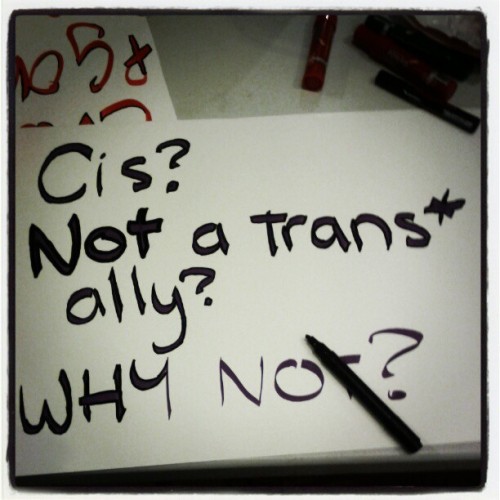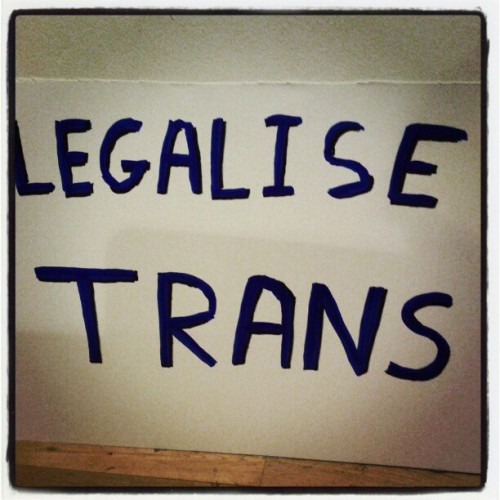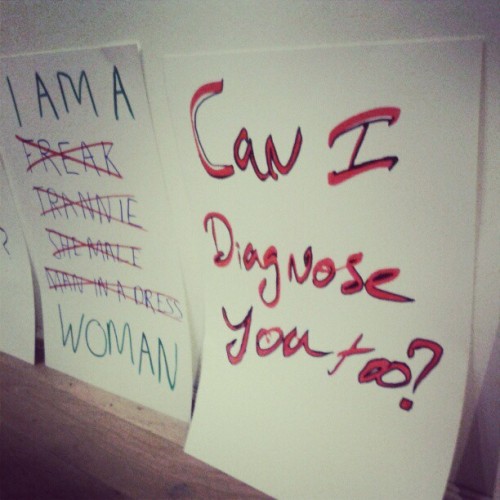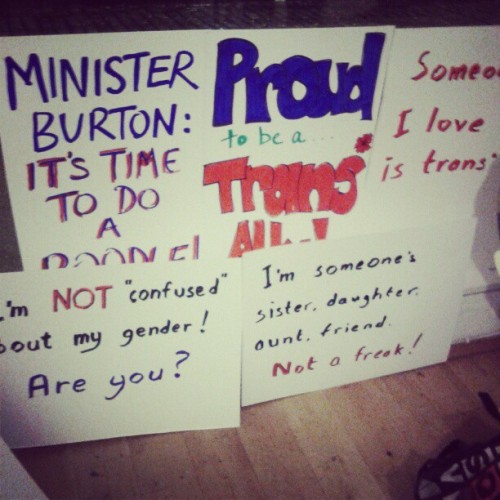With tomorrow’s International Day of Action for Trans* Depathologisation, there’s a lot of talk going around about why and how we need to recognise trans* people’s legal rights. And I’m struck by how much of a big deal is being made over what is, in essence, the simplest thing.

What do we want?
It’s been five years today since Lydia Foy won her case for gender recognition. Five long years. In those five years, we’ve seen the publication of the GRAG report and, uh, very little else. By the sounds of it, gender recognition must be a complicated thing, right? Requiring all sorts of intricate legislative bits and bobs (the technical term) to sort out?
That depends. As with so many things, what it depends on is perspective. It turns out, the complexity of gender recognition legislation seems to depend mainly on whether you see being trans* as a tragic medical condition, or a normal part of human variation that should be recognised. On whether you’re determined to Other trans* people or to acknowledge that gender is a thing that lives between our ears that we get to define any which way we like. Turns out that if we go with the second definition, things get simple really, really quickly.

Medical Tragedies or Self-Definitions
So what is being trans*? Is it a bizarre medical tragedy, an affliction that a small minority of people have to live with? Something a little bit scary that some people ust can’t help but that we should absolutely not be encouraging? Or is it a perfectly normal, if a bit less common than being cis, way to define yourself? And how does the answer to that question change what laws we put in place?
The recommendations of the GRAG report indicate that it tends toward the former definition. Here’s Maman Poulet:
The FF/Green Government formed the Gender Recognition Advisory Group in May 2010 to look at the issues which presented themselves following the Foy case. The group was entirely composed of Civil Servants and even though they received submissions and met with many groups from the rights and LGBT communities it is very evident that they really didn’t get it if an unnamed expert hadn’t told them.
Why was there no Trans rep on committee to at least provide an alternate view if even dissenting one? When the Government formed a group to look at the options for recognition of same sex relationships GLEN got a seat at the table….
The report recommends that Trans People applying for their gender to be recognised will have to have a formal diagnosis of Gender Identity Disorder with evidence of medical treatments or will have to have had Gender Reassignment Surgery. This means that one has to have had hormones and mental health treatment and assessment or gender surgery (and hormones and mental health assessment/treatment and everything else)… There is no understanding of the issues facing InterSex here at all..
…The report proposes that there is a panel which people will have to appear before made up of medical and legal representatives and one other where the applicant will will be told if they are a man or woman in the eyes of the state.
I know Trans people who are married and happily so, I know others who are divorced or separated. The report recommends that those applying for Gender Recognition be required to divorce or end their Civil Partnership before they can apply.
Let’s go over that again. In order to change their legal gender, a person would have to:
- Present a formal diagnosis of GID (defined as a mental illness)
- Have had medical treatments and/or surgical intervention
- Appear before a panel of medical and legal representatives to make their case
- If married, divorce.
- Oh, and also, because of the definition of GID, you can’t be intersex.
That’s a lot of barriers. You have to be diagnosed as mentally ill. You have to chemically or surgically change your body- which means that gender recognition would be denied to those who, for financial or medical reasons, can’t do this. Never mind bodily integrity. You have to convince a panel of strangers. And if you are happily married, you need to split up your family. And, most bizarrely of all, you need to have a binary-sexed body.

I could go into why this is ridiculous, but I’m going to trust that my lovely readers can work that out for yourselves. Instead, I want to show you a different model that is in place right now in Argentina. Let’s check out what TENI have to say about it:
The Argentinian Law is based on self-determination and provides full recognition of self-defined gender identity. Transgender people in Argentina will not need to prove they have had surgical procedures, hormonal therapy or other psychological treatment such as a diagnosis of a mental illness. This law clearly separates a legal right from medical interventions.
This law has been heralded as the most progressive in the world and signals a new era for transgender human rights. Justus Eisfeld, Co-director of Global Action for Trans Equality told press, “The fact that there are no medical requirements at all — no surgery, no hormone treatment and no diagnosis — is a real game changer and completely unique in the world. It is light years ahead of the vast majority of countries.”
However, while clearly separating medical interventions from the legal recognition process, the Argentinian law also provides a right to access any desired medical treatment which firmly enshrines the importance of transgender healthcare.
Huh. Well. Um. That was easy. So in order to get your gender legally recognised in Argentina you have to:
- Fill out a form. Probably take it in to be stamped by someone because this is a bureaucracy we’re talking about. I’ll bet there’s some queueing involved, so you might want to bring a book.
- Receive new documentation with correct gender.
- Continue to be able to freely access whatever medical transition you need to. THIS BIT IS IMPORTANT. Gender diversity is awesome. Gender dysphoria is really, really not, and depathologisation without ensuring access to treatment for dysphoria for everyone who needs it is worse than useless.
- Have a cup of tea, read the paper, give out about things on the internet, watch TV, go for a run, get on with your life, etcetc.
That last bit, by the way, is optional and can be adapted to your own preferences. As is the first bit. You might prefer a few podcasts to a book.
Note, by the way, how this involves vastly less hassle for everyone than the proposed Irish model. And how it also guarantees any trans* person the right to the transition-related healthcare that they want or need. So what, precisely, is getting in the way of Ireland doing the same? What are we so scared of? What’s the worst that could happen?

If we make it easy to change your gender, everyone will want to do it!
Fearmongers envisage a society where you, me, your ma and your entire secondary school history class are changing our genders like we change our shoes. In my case, that would be as rarely as possible, when the old ones are worn out and full of holes, with an awful lot of grumbling. But I gather that I’m not representative of everyone.
So there we are, with everyone changing their genders whenever the mood strikes them. Down is up, left is right, nobody knows what to call anybody and everyone’s in such a panic that they can’t even remember how to make a nice cuppa anymore.

What nobody seems to have explained is why this would be such a bad thing in the first place. If gender is all about how we identify ourselves, then why shouldn’t we get to change it? Why shouldn’t you, me, your ma and your entire secondary school history class get to cheerfully toddle down to the relevant department, sign a couple of dozen forms, hand over the inevitable fee and then do it all again a few weeks later when they change their mind? Why on earth would that be so terrible?
In fact, it might be pretty great.
For one thing, we’re in a recession here, and changing documents always costs money. Wouldn’t the hordes of people changing their gender markers be a fantastic source of revenue?
For another thing, this scenario inevitably means that people are going to magically forget that they live in a world filled with cissexism and transphobia and instead cheerfully (and with legal recognition) explore all the gender possibilities that they can. Nobody would get to assume just by looking, or by having known what it was last week, that they knew a person’s gender! Asking “what’s your pronoun?” would become as ordinary a question as “Jaysus, will this rain ever stop?”.
Of course, this scenario- as delightful as it is- is ridiculous. I’m sure there are some people in the world who like filling out forms for the lulz. I’m equally sure that it’s a minority sport.
So with that scenario out of the way, what else is there to be scared of?
Dogs And Cats Living Together
Did you notice that in Argentina, there’s no requirement to divorce the person you love in order to get your gender markers changed? That’s because in Argentina, they’ve reinforced their buildings from falling skies and reinforced their umbrellas for downpours of (literal) cats and dogs. All necessary precautions in order to allow same-sex marriage.

That’s right. If you let trans* people’s genders be recognised without forcing them to get divorced first, you’re going to have a situation where perfectly normal het couples, through a magical process probably involving radioactive spiders, start morphing into gay marrieds. Before your very eyes! WHO WILL BE SAFE? YOUR OWN NEIGHBOURS COULD TURN INTO THE GAYS AT ANY MOMENT.
So, uh, that’d be scary, right? Right? …….right?
What’ll we gain?
Oh, you know. Just little things. Dignity. Trans* people not being forced to out themselves whenever they have to present legal documents. Embracing people for who they are. Honouring bodily integrity and the sovereignty of each of us. Massive symbolic recognition throughout the country.
Little things like that.
Why’re you telling me all this now?
You can’t have forgotten, can you? Tomorrow is the International Day of Action for Trans* Depathologisation! If you’re in Dublin or can get here, and you’re even half as sick as I am of ridiculous, unnecessary barriers put in the way of trans* people’s legal rights, get that (remarkably attractive) ass of yours out to Kildare Street for 2.30pm.

Edited to add a Very Important Thing:
In writing this, I’ve realised- almost instantly after hitting ‘post’- that something that I’ve left out here is anything about gender dysphoria. As I’m running out the door right now, I’m going to leave you with some quotes from the wonderful Quarries & Corridors. Listen up, because this bit’s important!
There’s an incredibly important distinction that needs to be made clearly, front and centre in any debate about depathologising trans people. Having a gender that differs from that assigned to you at birth isn’t illness, it’s the gender dysphoria resulting from this that is. That may seem like semantics, but there is nothing wrong with me for having a nonbinary gender, I used to have gender dysphoria, now treated. Similarly, no one is ill for being a trans man or a trans woman, but the gender dysphoria from not having that recognised and affirmed hurts. The DSM-5 is already removing ‘Gender Identity Disorder’ & replacing it with ‘Gender Dysphoria’, pathologising our dysphoria not our genders. I think this is the right approach. It lets me be transgender without that being seen as disordered, it maintains access to medical care. Anyone making a lot of noise about depathologising trans* without making these important distinctions up front’s likely to do serious damage.
So let’s not forget that, k?

